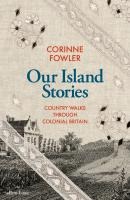''This is real, difficult, essential history delivered in the most eloquent and accessible way. Her case, that rural Britain has been shaped by imperialism, is unanswerable, and she makes her arguments beautifully. An important book'' Sathnam Sanghera
''A detailed and thoughtful exploration of historical connections that for too long have been obscured. A powerful book that brings the history of the Empire home - literally'' David Olusoga
The countryside is cherished by many Britons. There is a depth of feeling about rural places, the moors and lochs, valleys and mountains, cottages and country houses. Yet the British countryside, so integral to our national identity, is rarely seen as having anything to do with British colonialism. Where the countryside is celebrated, histories of empire are forgotten. In Our Island Stories, historian Corinne Fowler brings rural life and colonial rule together with transformative results. Through ten country walks, roaming the island with varied companions, Fowler combines local and global history, connecting the Cotswolds to Calcutta, Dolgellau to Virginia, and Grasmere to Canton.
Empire transformed rural lives for better and for worse: whether in Welsh sheep farms or Cornish copper mines, it offered both opportunity and exploitation. Fowler shows how the booming profits of overseas colonial activities, and the select few who benefited, directly contributed to enclosure, land clearances and dispossession. These histories, usually considered separately, continue to shape lives across Britain today.
To give an honest account, to offer both affection and criticism, is a matter of respect: we should not knowingly tell half a history. This new knowledge of our island stories, once gained, can only deepen Britons'' relationship with their beloved landscape.


